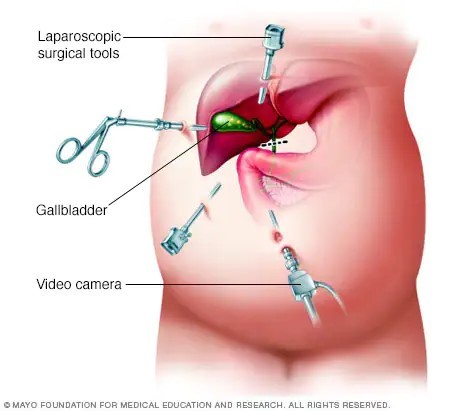A nurse is reinforcing teaching with a client who is postoperative following a laparoscopic cholecystectomy. Which of the following statements by the client indicates an understanding of the teaching?
“I should eat a high-fat diet for several weeks."
"I should expect to have diarrhea until my diet changes."
"I should expect to have nausea for several days."
"I should leave my steri-strips on until they fall off."
The Correct Answer is D
After a laparoscopic cholecystectomy, steri-strips or adhesive strips are commonly placed over the small incisions. The client should keep the steri-strips in place until they fall off on their own or until they are removed by the healthcare provider during a follow-up visit. Removing the steri-strips prematurely can increase the risk of infection or disrupt the healing process.
"I should eat a high-fat diet for several weeks": After a laparoscopic cholecystectomy, it is important for the client to follow a low-fat diet initially to allow the body time to adjust to the absence of the gallbladder. High-fat foods can be more difficult to digest and may cause digestive discomfort. Gradually introducing small amounts of fat back into the diet is recommended, but a high-fat diet is not appropriate.
"I should expect to have diarrhea until my diet changes": While changes in bowel movements can occur after a cholecystectomy, such as looser stools or changes in frequency, persistent diarrhea is not expected or normal. If the client experiences persistent diarrhea, they should contact their healthcare provider for further evaluation.
"I should expect to have nausea for several days": While some clients may experience mild nausea or discomfort after the surgery, it should generally improve within a few days. If the client experiences persistent or severe nausea, they should contact their healthcare provider.

Nursing Test Bank
Naxlex Comprehensive Predictor Exams
Related Questions
Correct Answer is ["A","B","D"]
Explanation
The nurse should take the following actions when receiving a telephone prescription from a client's provider:
- Ask the provider to spell out the name of the medication: This is important to ensure accurate transcription of the medication name. Spelling out the name helps prevent errors due to similar-sounding medications or confusion with abbreviations.
- Request that the provider confirm the read-back of the prescription: This step ensures that the nurse and the provider are on the same page and that the prescription has been accurately transcribed. It allows for verification and correction if any discrepancies are identified.
- Record the date and time of the telephone prescription: Documenting the date and time of the telephone prescription is essential for tracking and reference purposes. It helps establish a clear timeline of events and ensures proper documentation of the medication order.
It is not necessary to withhold the medication until the provider signs the prescription, as telephone prescriptions are typically followed up with a written prescription or electronic verification.
Instructing another nurse to record the prescription in the medical record may not be necessary, as the nurse who received the telephone prescription is responsible for accurately documenting the order in the medical record. However, if necessary, the nurse can delegate the task of documentation to another qualified staff member under their supervision, ensuring accuracy and completeness.
Correct Answer is B
Explanation
Prednisone can cause blood glucose levels to increase.
The nurse should explain to the client that the reason for checking his blood glucose level is because prednisone, a medication he is receiving, can cause an increase in blood glucose levels. Prednisone is a corticosteroid medication that is commonly used in the treatment of various conditions, including COPD. It has the potential to raise blood glucose levels by promoting gluconeogenesis (the production of glucose from non-carbohydrate sources) and decreasing insulin sensitivity. Monitoring blood glucose levels is important to assess and manage any potential hyperglycaemia or changes in the client's blood sugar levels while on prednisone.
Older adults are not at increased risk for developing type 1 diabetes mellitus in (option A) is incorrect. Type 1 diabetes is an autoimmune condition that typically occurs in childhood or adolescence, and it is characterized by the destruction of insulin-producing cells in the pancreas.
Albuterol treatments, which are used to relieve bronchospasms in clients with COPD, are not known to cause blood glucose levels to decrease in (option C) is incorrect. Albuterol is a beta-2 adrenergic agonist that primarily acts on the respiratory system and does not have a direct effect on blood glucose levels.
Having COPD does not directly cause blood glucose levels to fluctuate in (option D) is incorrect. While there can be various factors that may indirectly affect blood glucose levels in individuals with COPD (e.g., medications, stress, comorbidities), the primary reason for monitoring blood glucose in this case is the use of prednisone.
In summary, the nurse should explain to the client that the blood glucose levels are being checked because prednisone, a medication he is taking for his COPD, can cause an increase in blood glucose levels. This allows for appropriate monitoring and management of any potential hyperglycemia associated with the use of prednisone.
Whether you are a student looking to ace your exams or a practicing nurse seeking to enhance your expertise , our nursing education contents will empower you with the confidence and competence to make a difference in the lives of patients and become a respected leader in the healthcare field.
Visit Naxlex, invest in your future and unlock endless possibilities with our unparalleled nursing education contents today
Report Wrong Answer on the Current Question
Do you disagree with the answer? If yes, what is your expected answer? Explain.
Kindly be descriptive with the issue you are facing.
